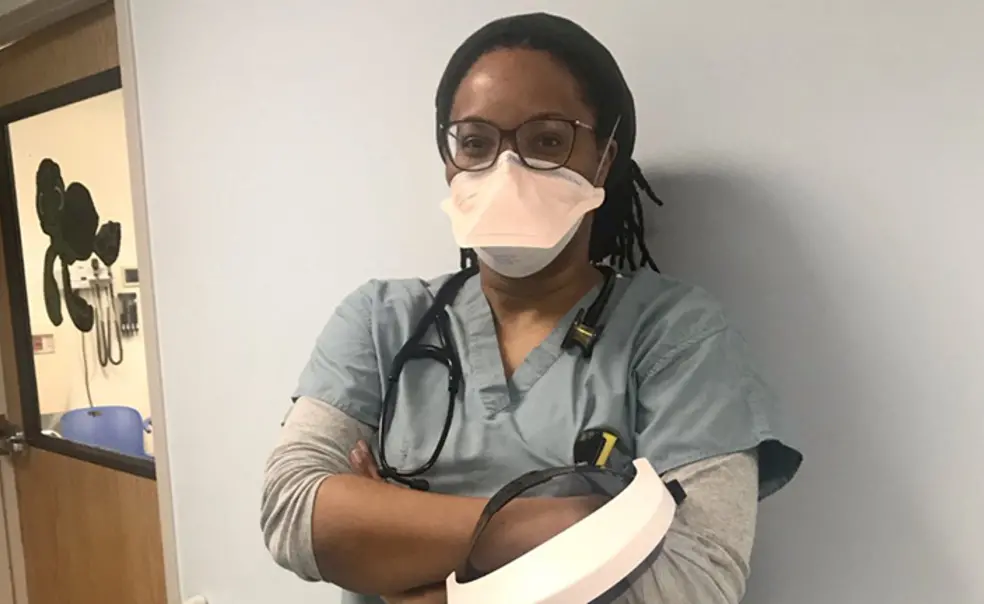Q&A: Emily Nichols ’99 on Keeping Up the Fight in New Orleans
‘We feel like it can be done’
When emergency-department physician Emily Nichols ’99 wrote for PAW’s Dispatches from a Pandemic series of essays, she was leading the New Orleans Emergency Medical Services into the fight against COVID-19. Nearly a year later, her staff is fatigued and battle-weary, but still going strong — and still recognizing that “it’s OK to not be OK.”
How has your work changed over the past year?
We’ve pivoted so much into focusing on how we can get our staff through this pandemic, and get our community through this pandemic, not only physically, but really also mentally and emotionally. We have been working directly with the health department to try and vaccinate as many people in the city of New Orleans as possible, and we have our EMTs and paramedics working not only to vaccinate first responders, but also working to coordinate with the local hospitals to provide a citywide distribution. And then we are going out into people’s homes and vaccinating persons who are homebound and/or bedridden. So our day-to-day involves a lot of planning around how to do that while simultaneously providing our routine 911 response.
The other thing that’s really magnified over the last several months is the pandemic fatigue and particularly the emotional distress of this disaster on health-care workers. We have built processes to try and support our employees as much as possible. Several of them have lost family members, have been sick themselves, and some of them still have ongoing debilitation from their acute illness.
How do you help people through?
I’ll start by saying it’s really heavy as an administrator and as a leader. It’s one thing to be willing to take that sacrifice for yourself — even if you’re scared to do it, you were trained, and you have to go bravely into the pandemic. But it’s another thing to feel the responsibility of sending other people into that. And so I think that mobilizes you to do more and to keep trying to find ways to do more.
One thing that is lovely about New Orleans is our community is always looking for a way to help their neighbor. That was there even before Katrina. So during the pandemic we have had so much love and support. The local restaurants have delivered food. We had a period of about two to three months where we had frozen dishes for all of our employees to the point that we purchased a second freezer. The local hotels and Airbnbs were able to provide space for our providers who were scared to go home to their families. Local psychiatrists and psychologists have been willing to give free mental health support.
We have two medical directors, and people know they can reach out to us and we can help them find resources. We have just been endlessly telling people it is OK to not be OK. And I think that’s the biggest thing, normalizing that this is super hard for everybody and especially people in health care.
Does it feel like there’s an end in sight?
I definitely feel hopeful. I do feel the light at the end of the tunnel. I remember this time last year, someone asked me when we’d be out of this, and I said, probably 2023. And the person was shocked. I’ve always had this perspective that this would not be a sprint.
We got our vaccines in the agency, the first doses, on Christmas Eve, and it really was symbolic of this gift and this sigh of relief, and this recognition that maybe more is to come. And our day-to-day is starting to become relatively routine. We’re already having talks about next winter and if there will be a peak and how are we going to anticipate and be ready for it, because the reality is this might be like the flu, where every season we have to worry about it. So we’re trying to shift to those possibilities, but I think simultaneously everyone feels a little more settled than we did even in the summer. We feel like it can be done. We always knew it could be done, but to feel it is a nice position to be in, finally.
Is there anything else you’d like to say?
I think just reminding everybody to hug a health-care provider, if it’s safe for you to do so. We want everyone to get through this and do what we need to do so that we can all be healthy, and so that the burden on our health-care community can be lessened.
Also, New Orleans EMS has a social media presence (@neworleansems) as well as a nonprofit foundation where anyone can support our hard-working first responders. Their website is www.noemsf.org.
Interview edited and condensed by Elisabeth H. Daugherty.












No responses yet